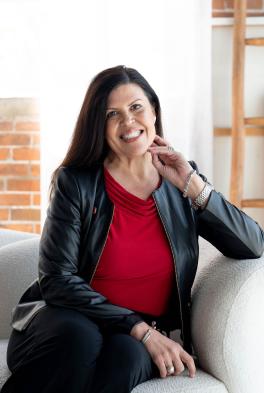Graduate alumni are using their skills in many lines of work. Career allies can support graduate students as they discern what career path is right for them. “Flight Paths” is series of alumni profiles — produced by the Global Arts and Humanities Imagined Futures: Graduate Professional Development Initiative— that highlights the key roles mentors play in equipping graduate students to imagine and prepare for a diverse array of meaningful careers. Each story describes a mentorship strategy that alumni found pivotal to their career success.

“Non-Traditional” From the Start
Nicole Nieto’s PhD experience at Ohio State was far from traditional. “I was working full time as I got my PhD,” she recalls. At the time, she was leading workshops on leadership development and belonging in HR, building on her earlier roles in women’s student services and international student support.
Unlike many others, she also didn’t set out to become a faculty member. “I don’t think I had these great aspirations to be a faculty member,” she reflects. “I thought, if I am, that would be great. But if I’m not, that’s fine too. I was not tied to a particular outcome.” Nieto worked steadily throughout graduate school, taking on university roles in student life, human resources, and gender equity in STEM. After completing her PhD in 2015, she found new leadership opportunities.
Nieto credits her co-advisors—Linda Mizejewski in WGSS and Amy Shuman in Folklore Studies/English— for their support during her nontraditional graduate path. “They gave me a lot of encouragement. Like so many others, I had imposter syndrome… They let me know the work I was doing was important and unique and most importantly that I belonged.”
She also cites formative moments in her graduate experience, especially community- based learning and civic engagement, as pivotal to her career direction. “That guided what I wanted to be doing: recognizing that we can make an impact,” she explains. “And I think that really solidified that I wanted to work in a higher education setting, encouraging students and others to make a difference.”
Leading with Your Values
Today, Nieto serves as Assistant Vice Provost for Outreach and Engagement in the Office of Academic Affairs, where she supports faculty, staff, and graduate students conducting
community-engaged research. “We do that through grants, awards, communities of practice, and professional development initiatives,” she explains. “We are offering more opportunities for graduate students—because we found that it’s really important to them to see how their research can make an impact.”
The office now runs a graduate student community of practice, a poster competition, and a new awards and grants program that includes a professional development stipend for engaged research. “I do think that this is another pathway,” she says. “Some graduate students want to be in communities or want to work in nonprofit organizations. They want their research to be meaningful beyond the academy.”
When asked what advice she’d offer current graduate students, Nieto speaks to letting go of the notion of one right way to do something. “Develop a network,” she says. “Do it in a way that’s meaningful to you. When I used to think of networking, I thought of it as something that could be inauthentic. But now I know that a network can look like people you meet for coffee or go on walks with – people that you can develop genuine and lasting connections with.”
She also encourages students to seek opportunities rather than wait for them. “Women typically put their heads down, do a good job, and think someone’s going to say, ‘Wow, you're doing great, here’s an opportunity.’ No. You have to ask. And don’t tell yourself no. Don’t take yourself out of the running for something.”
But her most central advice is about finding purpose: “Identify your core values —and lead with those. If you are acting from your core values… you’re always going to be doing that in an authentic way, because that’s who you are.”
The Takeaway
Nieto’s story demonstrates that doctoral education can fuel a career rooted in service, leadership, and justice even outside the professoriate. By staying grounded in her values and open to unexpected opportunities, she has built a fulfilling career in higher education administration, outreach, and engagement.
Her advice for faculty working with students considering alternative paths? “Ask them—are you interested in careers besides being a faculty member? Share alumni stories, point them to opportunities. And stay flexible. Maybe they’ll change their mind. Support them either way and make sure they know they belong.”
